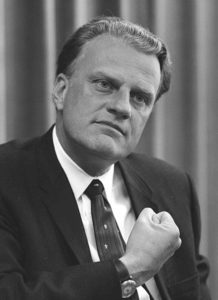Billy Graham: An Old Soldier Falls
Billy Graham was a preacher man equally intent on saving souls and soliciting financial support for his ministry. His success at the former is not subject to proof and his success at the latter is unrivaled.
When Graham succumbed to various ailments this week at the age of ninety-nine he left behind an organization that reached more people than any other Christian ministry in history, with property, assets, and a name-brand worth hundreds of millions. The address lists of contributors alone comprise a mother lode for the Billy Graham Evangelical Association, now headed by his son and namesake, William Franklin Graham III.
Graham also left behind a United States government in which religion plays a far greater role than before he intruded into politics in the 1950s. The shift from secular governance to “In God We Trust” can be laid squarely at this minister’s feet.
Graham’s message was principally one of fear: fear of a wrathful god; fear of temptation; fear of communists and socialists; fear of unions; fear of Catholics; fear of homosexuals; fear of racial integration; and, above all, fear of death. As a balm for such fears, he promised listeners eternal life, which he said was readily claimed through acceptance of Jesus Christ as one’s savior.
Furthermore, he assured listeners that God loved us so much that he created governments. To make this point, Graham frequently quoted Romans 13: “Let every person be in subjection to the governing authorities. For there is no authority except from God, and those which exist are established by God. Therefore he who resists authority has opposed the ordinance of God; and they who have opposed will receive condemnation upon themselves.” Almost perversely, he even endorsed the arrest of a woman who lofted a Christian banner during his Reagan-era visit to Moscow, opting for the crack-down of “divine” authority over the civil disobedience of a believer.
Based on that biblical mandate, Graham stood in solid opposition to the work of Dr. Martin Luther King Jr. In his Letter from Birmingham Jail, all but addressed to Graham, King noted, “We should never forget that everything Adolf Hitler did in Germany was ‘legal’ and everything the Hungarian freedom fighters did in Hungary was ‘illegal.’ … If today I lived in a Communist country where certain principles dear to the Christian faith are suppressed, I would openly advocate disobeying that country’s antireligious laws. ”
In light of the biblical endorsement of rulers, Graham supported police repression of Vietnam war protesters and civil rights marchers, opposed King’s civil disobedience, supported South American despots, and publicly supported every war waged by the United States from Korea forward.
Graham gave his blessing to every conflict under every president from Harry S. Truman to George W. Bush, and most of the presidents, pleased to enjoy public assurance of God’s approval, made him welcome in the White House. Graham excoriated Truman for firing General Douglas MacArthur and supported the general’s plan to invade China. He urged Richard Nixon to bomb dikes in Vietnam—knowing that it would kill millions of civilians—and he claimed to have sat on the sofa next to George H.W. Bush as the bombs began falling in the first Gulf War (though Bush’s diary version of the evening somehow excludes Graham, as does a White House video of Bush during the attack).
According to Bush’s account, in a phone call the preceding week, Graham quoted poetry that compared the president to a messiah destined to save the world, and in the next breath called Saddam Hussein the Antichrist.
Graham was a political operative, reporting to John F. Kennedy on purported communist insurgencies in Latin America, turning over lists of activist Christians to the Republican party, conferring regularly with J. Edgar Hoover and networking with the CIA in South America and Vietnam. He was even assigned by Nixon’s operatives to talk George Wallace out of a second run for the White House.
In every way, Graham was the spiritual father of today’s right-wing religious leaders who so inhabit the national conversation.
Graham will be cordially remembered by those who found solace in his golden promises and happy homilies, but the worldly blowback from his ministry is playing out in Iraq and Afghanistan, Chechnya and Korea, the Phillipines and Colombia—everywhere governments threaten human rights and pie in the sky is offered in lieu of daily bread.
In the words of Graham’s ministerial and secular adversary, Dr. King, “I had hoped that the white moderate would understand that law and order exist for the purpose of establishing justice and that when they fail in this purpose they become the dangerously structured dams that block the flow of social progress.”
Farewell Reverend Graham. Let justice roll.

